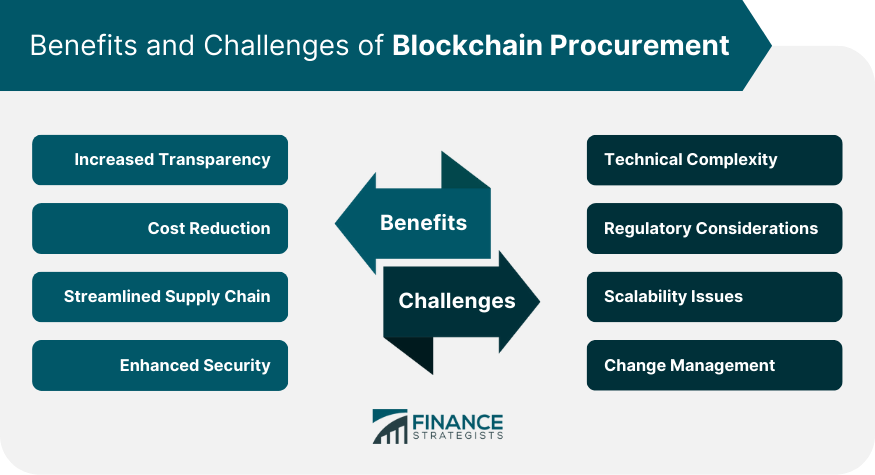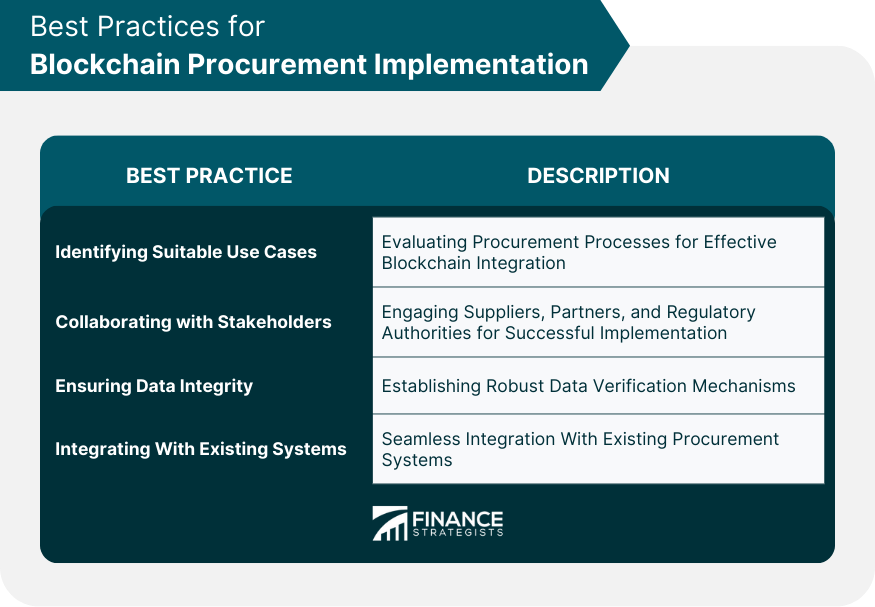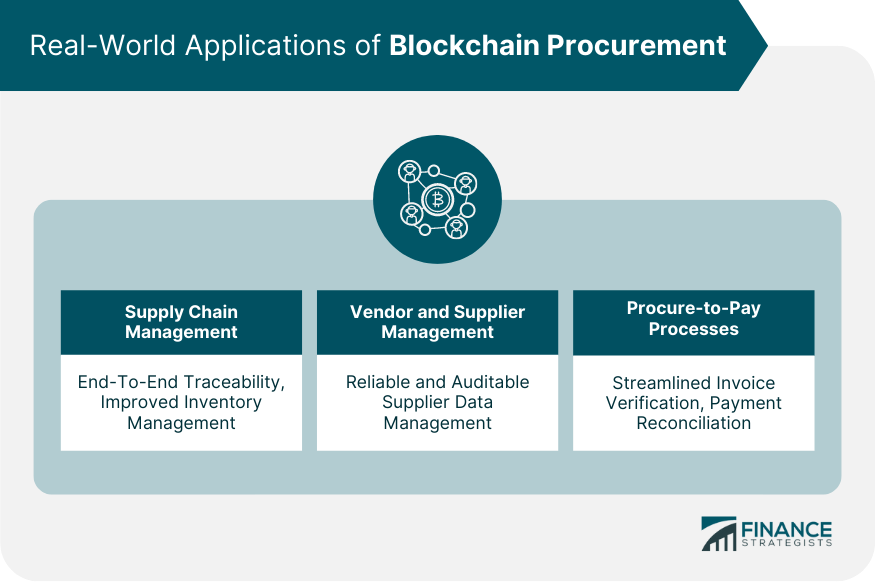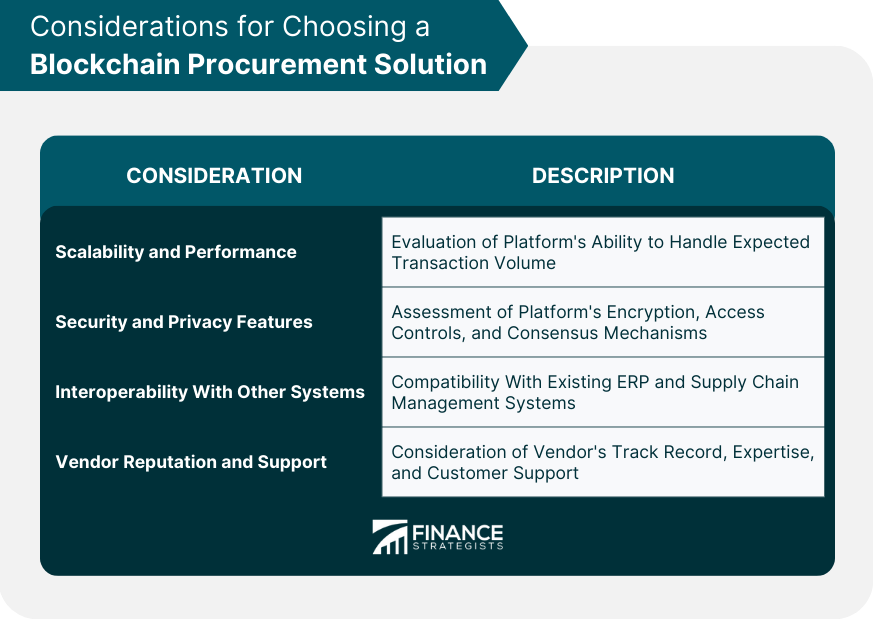Blockchain procurement refers to the utilization of blockchain technology in the procurement processes of organizations. It involves the secure and transparent recording of transactions, contracts, and other relevant data on a decentralized digital ledger. By leveraging the inherent features of blockchain, such as immutability and consensus mechanisms, organizations can enhance the efficiency, security, and transparency of their procurement activities. Incorporating blockchain procurement enables organizations to reduce the risk of fraud and counterfeiting. Every transaction is digitally signed and linked to the previous one, which helps in creating an immutable and traceable history. Furthermore, the use of smart contracts in blockchain procurement allows for the automatic enforcement of agreements, thereby reducing errors and speeding up the process. The decentralized nature of blockchain also ensures that no single entity has control over the entire procurement chain, reducing points of failure. Blockchain procurement operates on a decentralized network of computers called nodes. These nodes maintain and validate the blockchain, ensuring transparency and eliminating the need for intermediaries. Blockchain procurement achieves transparency by allowing all participants to access the same version of the blockchain. As transactions are recorded on an immutable and decentralized ledger, stakeholders can verify and track procurement activities in real time. Smart contracts, coded on the blockchain, automate and enforce predefined terms and conditions. By executing these contracts automatically, blockchain procurement reduces the need for manual intervention, streamlining processes and minimizing errors. Blockchain technology ensures the security of procurement data through cryptographic techniques. Digital signatures and hash functions protect against tampering and unauthorized access. These security measures build trust among participants, enhancing the reliability of procurement transactions. Implementing blockchain procurement brings cost savings and efficiency improvements. By removing intermediaries and automating processes, organizations reduce overhead costs and achieve faster transaction settlements. This efficiency allows for more streamlined procurement operations. Blockchain procurement enhances transparency by recording transactions on an immutable and decentralized ledger. As a result, stakeholders have access to real-time information, promoting accountability and reducing the risk of corruption. Blockchain procurement reduces costs by eliminating intermediaries, paperwork, and manual processes. The automation enabled by smart contracts reduces the need for manual verification and reconciliation, resulting in significant cost savings. Integrating blockchain into the procurement process streamlines supply chain management. The decentralized nature of blockchain allows for real-time tracking of goods and materials, improving traceability and reducing delays and errors. Blockchain's cryptographic algorithms provide a high level of security for procurement transactions. Digital signatures and encryption ensure that only authorized individuals can access and modify data, protecting against unauthorized tampering and fraud. Implementing blockchain procurement requires technical expertise and resources. Organizations need to understand the underlying technology, select suitable blockchain platforms, and address integration challenges with existing systems. The regulatory landscape surrounding blockchain technology is evolving. Organizations must navigate legal and compliance frameworks to ensure that blockchain procurement aligns with existing regulations and standards. As blockchain networks grow, scalability becomes a concern. The transaction processing capacity of certain blockchain platforms may be limited, potentially causing delays or congestion in procurement activities. Addressing scalability issues is crucial for seamless operations. Introducing blockchain procurement requires a shift in organizational culture and processes. Stakeholders may resist change due to unfamiliarity with the technology or concerns about its impact on existing processes. Effective change management strategies are necessary to address these challenges. Organizations should carefully evaluate their procurement processes to identify areas where blockchain technology can bring the most value. Use cases such as supplier management, contract management, and procure-to-pay processes are potential candidates for blockchain implementation. Successful implementation of blockchain procurement requires collaboration with various stakeholders, including suppliers, partners, and regulatory authorities. Engaging them early in the process helps address concerns, ensure buy-in, and foster a supportive ecosystem. Maintaining data integrity is vital in blockchain procurement. Robust data verification mechanisms should be established to ensure that only accurate and validated information is recorded on the blockchain. This guarantees the reliability of procurement data. Seamless integration with existing procurement systems is critical. Organizations must identify the right integration points and establish secure and reliable data transfer mechanisms to ensure smooth operations and minimize disruptions. Blockchain procurement finds extensive applications in supply chain management. It enables end-to-end traceability of goods, improves inventory management, facilitates quality control, and enhances supplier relationship management. The transparent and auditable nature of blockchain enhances trust and simplifies due diligence. Blockchain-based vendor and supplier management systems help organizations maintain reliable and up-to-date supplier data. The transparent nature of blockchain enhances trust, simplifies due diligence, and enables efficient supplier onboarding and management. Implementing blockchain in procure-to-pay processes streamlines invoice verification, payment reconciliation, and contract compliance. Smart contracts automate these processes, ensuring accuracy, reducing delays, and minimizing disputes. Evaluating the scalability and performance of blockchain platforms is crucial. Organizations should choose a solution capable of handling the anticipated transaction volume and providing adequate processing speed to ensure smooth operations. Security and privacy are paramount in blockchain procurement. Organizations should assess the security measures implemented by blockchain platforms, including encryption, access controls, and consensus mechanisms, to protect sensitive procurement data. Interoperability with existing systems is essential for the seamless integration of blockchain procurement. Compatibility with enterprise resource planning (ERP) systems, supply chain management software, and other relevant tools should be considered to avoid data silos. Selecting a reputable blockchain procurement solution provider is vital. Organizations should assess the vendor's track record, industry expertise, customer support capabilities, and commitment to ongoing system upgrades and maintenance. The regulatory environment surrounding blockchain is evolving, and organizations must comply with existing laws and regulations. Navigating the legal landscape and addressing potential compliance issues is crucial to successful implementation. Blockchain's transparency can present challenges related to data privacy. Organizations must implement appropriate privacy measures to ensure that sensitive procurement data is accessible only to authorized parties, protecting privacy rights. Blockchain technology is still maturing, and there are risks associated with its adoption. Vulnerabilities in blockchain platforms, potential software bugs, and the need for continuous upgrades require organizations to stay vigilant and address technological risks proactively. The adoption of blockchain procurement may face resistance from stakeholders who are unfamiliar with the technology or have concerns about its impact on existing processes. Effective change management and education initiatives are necessary to address these challenges and foster adoption. Before implementing blockchain procurement, organizations should evaluate their technical capabilities, resource availability, and organizational preparedness. A well-defined plan should be developed, outlining objectives, timelines, and key milestones. Selecting an appropriate blockchain platform is crucial for successful implementation. Factors such as scalability, security features, consensus mechanisms, and development tools should be considered when choosing a platform that aligns with the organization's needs. The design phase involves determining the specific features, functionalities, and workflows of the blockchain procurement solution. Rigorous testing should be conducted to identify and address any potential issues or vulnerabilities before deployment. The deployment phase involves the actual implementation of the blockchain procurement solution. Seamless integration with existing systems, such as ERP or supply chain management software, should be ensured to maintain continuity and avoid disruptions. Blockchain procurement presents numerous advantages, such as enhanced transparency, cost reduction, improved supply chain management, and bolstered security. It has the potential to revolutionize procurement processes with its robust features, such as decentralized control, smart contracts, and rigorous security measures. However, the adoption of this technology also comes with challenges, including technical complexity, regulatory considerations, scalability issues, and the need for effective change management. Best practices for implementation involve careful selection of use cases, collaboration with stakeholders, ensuring data integrity, and seamless integration with existing systems. Despite these challenges, real-world applications demonstrate the transformative potential of blockchain procurement in areas such as supply chain management, vendor and supplier management, and procure-to-pay processes. Implementing blockchain procurement successfully requires strategic planning, choosing the right platform, careful design and testing, and effective deployment and integration. Consult a professional financial advisor to guide your organization through this innovative journey.What Is Blockchain Procurement?
How Blockchain Procurement Works
Decentralization and Transparency
Smart Contracts and Automation
Security and Verification
Costs and Efficiency
Benefits of Blockchain Procurement
Increased Transparency
Cost Reduction
Streamlined Supply Chain
Enhanced Security
Challenges in Implementing Blockchain Procurement
Technical Complexity
Regulatory Considerations
Scalability Issues
Change Management

Best Practices for Blockchain Procurement Implementation
Identifying Suitable Use Cases
Collaborating With Stakeholders
Ensuring Data Integrity
Integrating With Existing Systems

Real-World Applications of Blockchain Procurement
Supply Chain Management
Vendor and Supplier Management
Procure-To-Pay Processes

Considerations for Choosing a Blockchain Procurement Solution
Scalability and Performance
Security and Privacy Features
Interoperability With Other Systems
Vendor Reputation and Support

Risks and Limitations of Blockchain Procurement
Regulatory and Legal Concerns
Data Privacy and Protection
Technological Risks
Adoption Challenges
Implementing Blockchain Procurement: Steps and Strategies
Assessing Readiness and Planning
Choosing the Right Blockchain Platform
Designing and Testing the Solution
Deployment and Integration
Final Thoughts
Blockchain Procurement FAQs
Blockchain procurement utilizes decentralized technology to enhance transparency, automate processes, and secure procurement transactions.
Blockchain procurement offers increased transparency, cost reduction, streamlined supply chains, and enhanced security for organizations.
Technical complexity, regulatory considerations, scalability issues, and change management are common challenges to address.
Identifying suitable use cases, collaborating with stakeholders, ensuring data integrity, and integrating with existing systems are key practices.
Blockchain is applied in supply chain management, vendor/supplier management, and procure-to-pay processes to enhance efficiency and traceability.
True Tamplin is a published author, public speaker, CEO of UpDigital, and founder of Finance Strategists.
True is a Certified Educator in Personal Finance (CEPF®), author of The Handy Financial Ratios Guide, a member of the Society for Advancing Business Editing and Writing, contributes to his financial education site, Finance Strategists, and has spoken to various financial communities such as the CFA Institute, as well as university students like his Alma mater, Biola University, where he received a bachelor of science in business and data analytics.
To learn more about True, visit his personal website or view his author profiles on Amazon, Nasdaq and Forbes.











